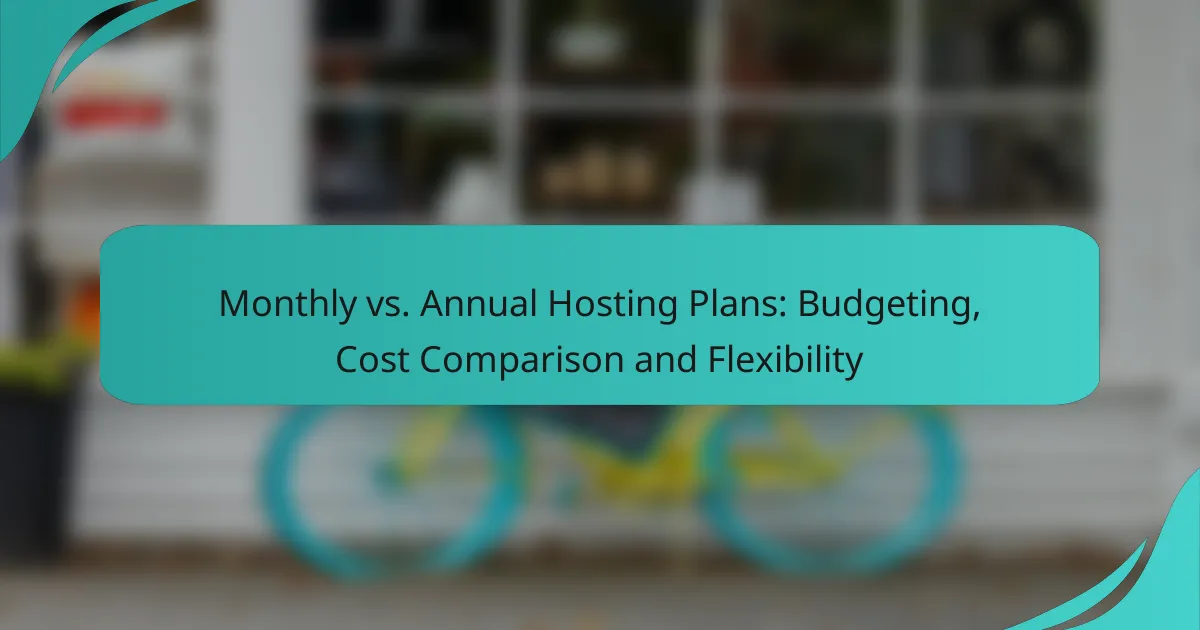When choosing between shared and VPS hosting plans, understanding their cost-effectiveness, performance, and scalability is crucial. Shared hosting offers a budget-friendly option with limited resources, while VPS hosting, though initially more expensive, provides dedicated resources that enhance performance and allow for greater scalability. This makes VPS an ideal choice for growing websites that require consistent speed and the ability to adapt to increasing demands.

What are the cost differences between Shared and VPS Hosting in Canada?
The cost differences between shared and VPS hosting in Canada primarily stem from the resources allocated to each type. Shared hosting is generally more affordable, while VPS hosting incurs higher initial costs but offers better performance and scalability.
Shared hosting is typically cheaper
Shared hosting plans are often the most budget-friendly option, with prices usually ranging from CAD 5 to CAD 15 per month. This low cost is due to multiple users sharing the same server resources, which reduces overhead for the hosting provider.
However, the trade-off for this affordability is limited performance and resources. Websites on shared hosting may experience slower load times and less reliability during peak traffic periods.
VPS hosting has higher upfront costs
VPS hosting plans typically start around CAD 20 and can go up to CAD 100 or more per month, depending on the resources allocated. This higher cost is due to the dedicated resources each VPS account receives, which can significantly enhance performance.
While the initial investment is greater, VPS hosting provides users with more control and customization options, making it a suitable choice for growing businesses or websites with higher traffic demands.
Long-term savings with VPS can be significant
Although VPS hosting has higher upfront costs, it can lead to long-term savings. As your website grows, the performance benefits of VPS can reduce downtime and improve user experience, potentially leading to increased revenue.
Additionally, VPS plans often allow for easy upgrades as your needs change, which can save you from having to migrate to a different hosting provider later on.
Prominent providers include Bluehost and HostGator
In Canada, popular hosting providers like Bluehost and HostGator offer both shared and VPS hosting plans. Bluehost is known for its user-friendly interface and competitive pricing, while HostGator provides robust VPS options with flexible configurations.
When choosing a provider, consider factors such as customer support, uptime guarantees, and scalability options to ensure you select the best hosting solution for your needs.

How does performance compare between Shared and VPS Hosting?
Performance between shared and VPS hosting differs significantly, primarily due to resource allocation. VPS hosting provides dedicated resources, leading to more consistent performance, while shared hosting can suffer from slower speeds due to resource sharing among multiple users.
VPS offers dedicated resources
VPS hosting allocates specific amounts of CPU, RAM, and storage to each user, ensuring that your website has the resources it needs to perform optimally. This dedicated environment means that even during high traffic periods, your site can maintain speed and responsiveness.
For example, a VPS plan may offer 2 GB of RAM and 2 CPU cores, which can handle moderate traffic without lag. This is particularly beneficial for e-commerce sites or applications requiring reliable uptime.
Shared hosting can lead to slower speeds
In shared hosting, multiple websites share the same server resources, which can lead to performance issues. If one site experiences a spike in traffic, it can slow down the loading times for all other sites on the same server.
As a result, shared hosting is often suitable for small personal websites or blogs with low traffic, but it may not be ideal for businesses that rely on consistent performance. Users may notice loading times in the range of several seconds during peak usage times.
Performance varies by provider
The performance of both shared and VPS hosting can vary significantly based on the hosting provider. Some providers optimize their servers and offer better technology, while others may cut costs, leading to slower speeds and less reliable service.
When choosing a provider, consider factors like server location, customer reviews, and performance guarantees. A reputable VPS provider may offer uptime guarantees of 99.9% or higher, while shared hosting providers may not provide such assurances.

Which hosting option is more scalable in Canada?
VPS hosting is generally more scalable than shared hosting in Canada. With VPS, users can easily upgrade resources like CPU, RAM, and storage as their needs grow, while shared hosting has fixed limits that can hinder performance during traffic spikes.
VPS allows for easy resource upgrades
VPS hosting provides the flexibility to upgrade resources without significant downtime. Users can typically increase their allocated CPU, RAM, and disk space with just a few clicks or a simple request to their provider. This adaptability is crucial for businesses experiencing growth or fluctuating traffic.
For example, if a website starts receiving more visitors, a VPS plan can be adjusted to accommodate this increase, ensuring consistent performance. Many VPS providers offer tiered plans, allowing users to select a package that aligns with their current needs and upgrade as necessary.
Shared hosting has limited scalability
Shared hosting is designed for smaller websites and typically has strict resource limits. When a site hosted on a shared server experiences increased traffic, it can lead to slower load times or even downtime, as resources are shared among multiple users. This makes shared hosting less suitable for businesses that anticipate growth.
Additionally, upgrading from shared hosting often requires migrating to a different plan or provider, which can be time-consuming and complicated. Users may find themselves needing to switch to VPS or dedicated hosting sooner than expected, leading to potential disruptions.
Popular VPS providers include DigitalOcean and Linode
In Canada, DigitalOcean and Linode are well-regarded VPS providers known for their scalability and performance. DigitalOcean offers a range of plans that cater to various needs, from small projects to large applications, making it easy to scale as required.
Linode also provides competitive pricing and a user-friendly interface, allowing users to manage their resources effectively. Both providers offer robust support and documentation, which can help users navigate upgrades and optimize their hosting environment.

What are the security features of Shared vs. VPS Hosting?
Shared hosting and VPS hosting differ significantly in their security features. VPS hosting offers more robust security controls due to its dedicated resources, while shared hosting can expose users to higher risks due to resource sharing among multiple sites.
VPS provides enhanced security controls
VPS hosting allows users to implement advanced security measures such as firewalls, intrusion detection systems, and dedicated IP addresses. These features help protect against unauthorized access and attacks, making VPS a suitable choice for businesses handling sensitive data.
Additionally, VPS environments can be customized to meet specific security requirements, allowing for tailored configurations that enhance overall protection. Users can also install security software and regularly update their systems without affecting other users, which is often a limitation in shared hosting.
Shared hosting is more vulnerable to breaches
In shared hosting, multiple websites share the same server resources, which can lead to increased vulnerability. If one site on the server is compromised, it can potentially affect all other sites sharing that server, making it a riskier option for sensitive applications.
Moreover, shared hosting environments typically offer limited security features, such as basic firewalls and shared SSL certificates, which may not provide adequate protection against sophisticated attacks. Users must be vigilant and follow best practices, such as using strong passwords and keeping software updated, to mitigate risks.

What are the management requirements for Shared and VPS Hosting?
Shared hosting typically requires minimal management from users, while VPS hosting often demands a higher level of technical expertise. Understanding these management requirements can help you choose the right hosting plan based on your skills and needs.
Shared hosting is often fully managed
With shared hosting, the hosting provider usually handles all server management tasks, including updates, security, and backups. This allows users to focus on their websites without needing in-depth technical knowledge.
Common features of fully managed shared hosting include automatic software updates, customer support for technical issues, and user-friendly control panels. This makes it an ideal choice for beginners or small businesses looking for a cost-effective solution.
VPS may require technical expertise
VPS hosting offers more control and resources but often requires users to manage their own server environment. This can include configuring the server, installing software, and performing security updates, which may be challenging for those without technical skills.
While some VPS providers offer managed services, many expect users to have a basic understanding of server management. If you choose a VPS plan, consider your technical abilities and whether you might need to hire additional help for maintenance.

How do user needs influence the choice between Shared and VPS Hosting?
User needs significantly impact the decision between Shared and VPS hosting. Shared hosting is typically more cost-effective for smaller websites with lower traffic, while VPS hosting offers enhanced performance and scalability for growing businesses.
Small businesses may prefer Shared hosting
Shared hosting is often the go-to option for small businesses due to its affordability and simplicity. With plans generally ranging from $3 to $10 per month, it allows startups to establish an online presence without significant upfront costs.
These plans provide essential features such as a user-friendly control panel, email accounts, and basic customer support. However, shared resources mean that performance can fluctuate based on the activity of other users on the same server, which may impact loading times during peak traffic.
Small businesses should consider their growth trajectory. If they anticipate rapid growth or increased traffic, they might need to plan for an upgrade to VPS hosting sooner rather than later.
VPS hosting suits growing businesses
VPS hosting is ideal for businesses experiencing growth or those that require more control over their hosting environment. Starting at around $20 per month, VPS plans offer dedicated resources, which means better performance and stability compared to shared hosting.
With VPS, users can customize their server settings and install specific applications, making it a flexible option for businesses with unique requirements. This level of control is particularly beneficial for e-commerce sites or applications that demand consistent uptime and speed.
While VPS hosting comes at a higher cost, the investment can lead to improved user experience and potential revenue growth. Businesses should evaluate their current needs and future goals to determine if the benefits of VPS justify the additional expense.










